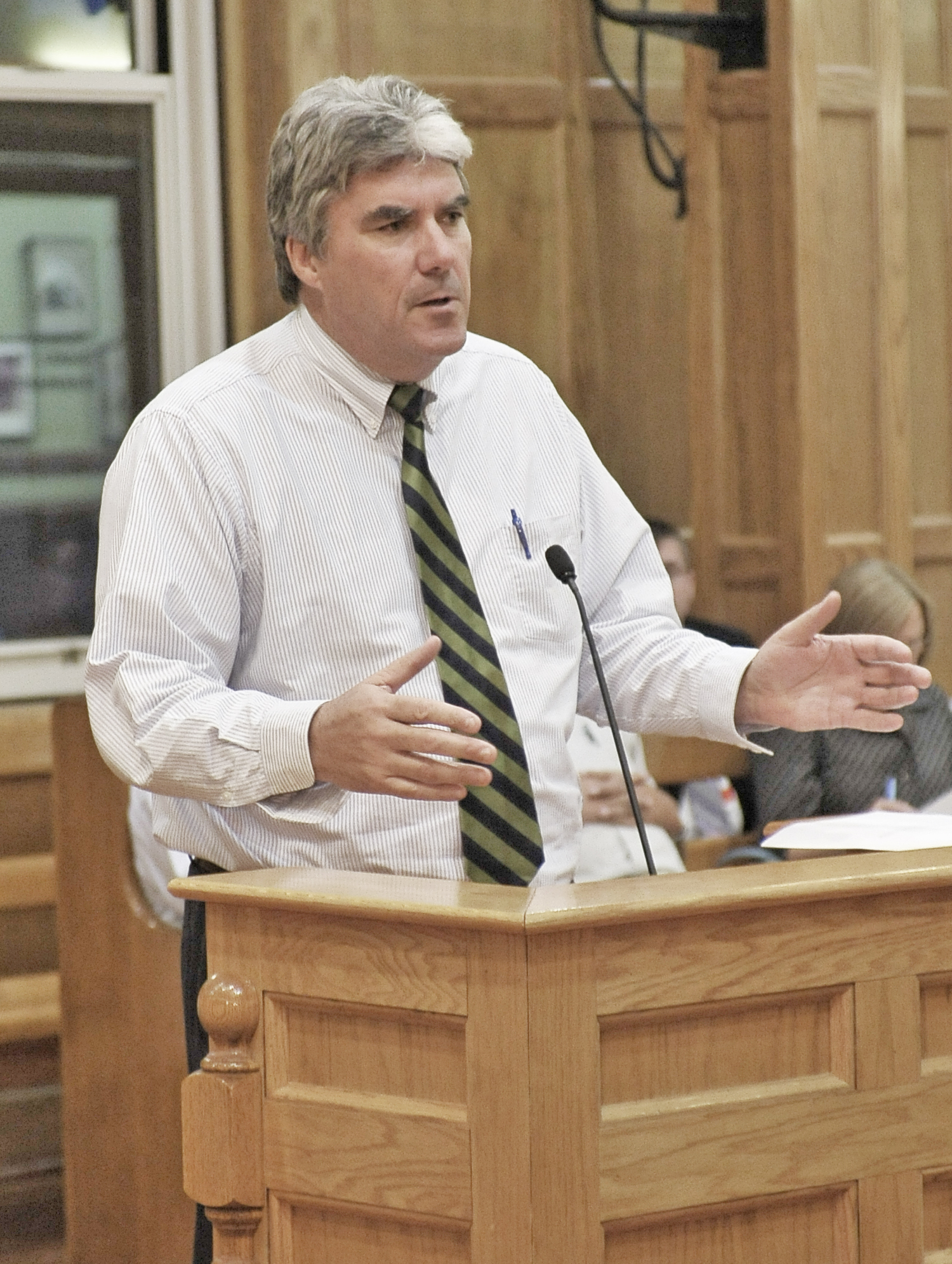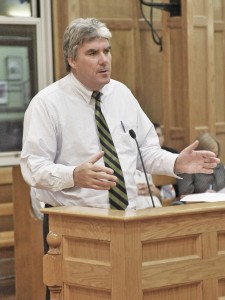WESTFIELD – The School District came out in force to the Finance sub-committee budget review, with a couple of dozen members of the administration, principals, and School Committee members present as Superintendent Stefan Czaporowski and Chief Financial Officer Ronald R. Rix addressed Councilors Andrew K. Surprise, chairman pro temp, Matthew Emmershy, and the other councilors in attendance.
Rix began by introducing the budget before the councilors, which he said was proposed in April, and was subsequently reduced by $250,000 by the School Committee. He said the total budget is $61,290,790, of which 56.5% is paid by the state, which represents an overall 1.85% increase, and a 2.8% increase of local aid.
Rix also pointed out that $225,000 of costs in the budget were previously listed on the city side, including trash pickup and a technology administrative position.
Rix said the district budget is 80% personnel and 20% on the expense side. He said even though there is a net increase of $734,248 in personnel that includes the elimination of 12 positions, which he said would save $190,000 on the city side in reduced benefits and health insurance costs.
Savings were also made through redistricting by eliminating the $100,000 lease currently paid for Russell Elementary School. He said there has been an increase in other rents, because the district is renting Hangar II at Barnes Airport for $31,000 for the Aviation Maintenance Technology program, due to an FAA requirement of Fair Market Value leasing. Rix said they are removing the lease of the parking lot at St. Peter’s/St. Casimir’s Parish.
Emmershy asked since parking for the Cross Street School is off the table, what about storage for materials? Rix said on the city side of the budget, they are looking to repurpose materials. He said they are working with the city to close that out.
Rix said the district is projecting $81,000 in federal reimbursement for refugees from Hurricane Maria, the floods in Texas and wildfires in California that will be coming in after July 1, and will revert back to Free Cash.
Another highlight in the budget is $301,000 savings in severance costs, which are being phased out over the next couple of years. Rix said the savings were negotiated in exchange for a slight increase in longevity of $61,000. Next year, the district will save another $200,000 in severance, he said.
One increase in the budget is in charter school fees. According to pre-enrollment figures which cut off in April 1, 71 students pre-enrolled in the Hampden Charter School of Science in West Springfield. Rix said the school was originally intended to relocate to Westfield, and both he and Supt. Czaporowski said they expect that figure to go down by the Oct. 1 census, due to the relocation of the school. Rix said the worst case scenario for the budget would be a $158,000 increase in costs.
Emmershy noted that the enrollment projection for FY19 is down by 42 students. ”Is that factoring in 72 students for the charter school?”
Czaporowski said it did. “I don’t think 72 kids will be going out of the city,” he said. Westfield does not have to provide transportation for charter schools not located within the city.
“It would be helpful to see where the big increases are in the future, if we could get that data prior to the end of the fiscal year,” Surprise said. Rix said he would work with them on that for next year.
Surprise asked whether transportation went down. Rix said it went up slightly, by $5 per bus per day in the second year of a three-year contract. “Transportation always comes up when we look at the budget. The issue in Westfield is not the number of students on the bus, but the number of miles,” Rix said.
Rix said with Transportation Director Pamela Kotarski’s work on rerouting buses and changing school starting times, the district saved what would have been a $500,000 increase.
Surprise asked about expenses for out of district transportation. Rix said they are $616,000, which is a reduction of $28,000.
Rix also noted that $3.85 million in out-of-district special education tuition is offset with $1.6 million in reimbursement. He said the district uses circuit breaker funds of $980,000 to $1 million pay for the tuition.
Surprise asked about the total number of grants. Rix said there was an increase of $334,000 in FY18 over FY17, but this year, some of the federal entitlement grants have been reduced. This year will also be the last year for the Early Childhood grant which has been phasing out, and will be $43,000 this year.
Surprise asked about the savings from closing down Russell Elementary School. Rix said at least six positions were eliminated, plus the savings of $100,000 for rent, and $43,000 for heat and utilities.
“It cost us $1.7 million to operate Russell School – most was reassigned,” Rix said.
In response to another question, Rix said there has been a slight increase from athletic fees, which go right back into equipment and supplies, as well as some transportation. He said the end of year balance at both high schools is significantly higher this year.
Talking about technology, Czaporowski said the district bought over 2,000 Chromebooks for students last year, which he said are giving savings everywhere. Textbooks and workbooks in the budget are down $82,000, which has been redeployed to purchase educational software. Rix said they’ve been strategic in only buying software they use, not packages
Surprise asked about software used for English as a Second Language (ESL) classes. Czaporowski said they have ESL teachers, and are using some software. He said last year, ESL was taught exclusively at Highland; this year it is at Highland and Munger Hill.
“Why are we offering it at the two schools,” asked Surprise.
Rix said they are also adding two ESL staff at Westfield Intermediate School and Westfield Middle School. He said there are slight increases in the program, but it’s a better model for the students.
Surprise also noted that Title 1 funding has decreased. Christopher Rogers, Administrator of Student Interventions said that Title I is probably going to go down from this year to next year, because the number if disadvantaged students have gone down. Rix said the grant is $1.2 million, down from $1.3 million.
Asked about adding vocational programs, Czaporowski said most of the students that go to Smith Vocational are for programs such as farming and veterinary services that WTA doesn’t offer. He also said they are looking to start a pathway to criminal justice at WHS.
“I don’t have the physical space to open more programs currently,” said WTA Principal Joseph Langone.
Czaporowski said they are working with Springfield Technical Community College on a medical terminology program. “We are working with UMASS as well. We have a lot of hands in this, trying to have as many opportunities for our students as possible,” he said, adding that is also the purpose of the newly reopened Career Center at WHS.
Ward 2 Councilor Ralph J. Figy, who is the School Liaison, said the eighth grade does a good job of helping kids choose. He said there are also programs coming in through the WE2BA (Westfield Education to Business Alliance) showing students what careers are available. “There’s a lot going on. I can’t emphasize enough; take some time, go to School Committee meetings. That’s where most of this information is presented,” Figy said.
Surprise asked whether administrative costs were going down or up. Rix said they are roughly the same, 1.8 or 1.9% of the budget. “They’re pretty low,” Czaporowski said.
“We’re significantly lower than the state average in out-of-district special education and administrative costs.
“We can’t get around that the bulk of the increases are in personnel. They don’t get a raise every year. I want the staff to be prepared for that. I’m not saying they’re not deserving of a raise, it’s just we can’t afford it,” Surprise commented.
“You guys did a fantastic job. I like this communication. We don’t have the money to do what everybody wants to do. You’re getting all of the increases across the city. In order to support that $900,000 increase, it really is a big deal,” said Councilor David Flaherty, adding, “There are going to be cuts. The next one behind you is a $500,000 increase, and that has to do with employee pensions.”
Rix clarified that the district is asking for about a $1.1 million increase to the overall budget; but, with an increase of $408,000 in increased state aid (chapter 70), that brings down the increase to the city portion to about $708,000. With the $ 220,000 of cost the city side of the budget covered in the past, that leaves a net increase of just under $500,000 to the city’s portion of the budget.
In closing, Rix thanked the committee, and said he appreciated all of the councilors who attended the meeting.







